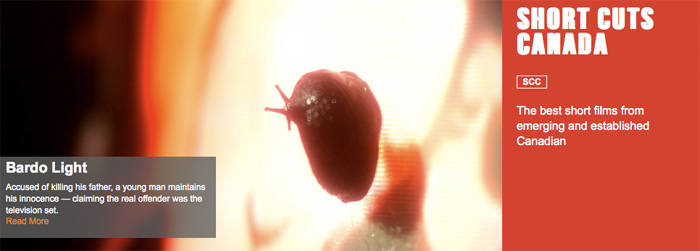
With all the buzz around world premieres and gala events happening at the Toronto International Film Festival, it’s easy to forget there is also a pretty stellar shorts program in the mix. Consisting of work spanning all genres, the format is a great way to experience new, upcoming talent as well as to check up on a couple familiar faces too. The following is a collection of capsule reviews and scores for each short in their respective screening blocks.
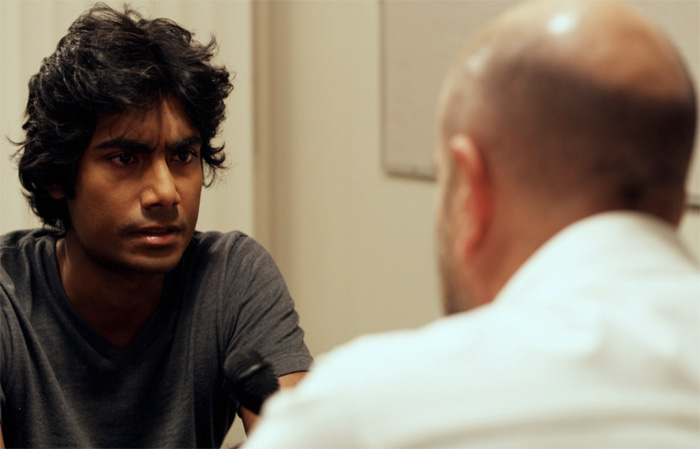
Bardo Light – 10 minutes
What do you get when you mix the Tibetan Book of the Dead, the ancient metallurgical science of alchemy, and the namesake of inventor Philo Farnsworth? The answer is Connor Gaston‘s short film Bardo Light—titled for the bright glow none of us can avoid at the end of our lives.
Told via the police interrogation of the younger Farnsworth (Shaan Rahman) after his adopted father (Bill Gaston) was found suffocated to death in their cabin, we quickly learn of successful experiments using television to control animals. As the pair continued progressing forward in the research, the irresistible force that is God’s Light was released with dire consequences.
A nicely constructed work pitting the extreme seriousness of Rahman’s scientific explanations against the interrogator’s (Chris Mackie) comedic refusal to believe, truth is put into the eyes of the beholder as only prayer remains to help guide souls lost. Complete with intriguing art direction for the modified televisions and fun footage of the animals hypnotized by its glow, the commentary on society’s ever increasing capacity to become slaves to brainless entertainment is laid forth for all to see. Pushed aside as merely a powerless gadget, the truth of television is its ability to lock us inside while suffocating our desire to live.
B
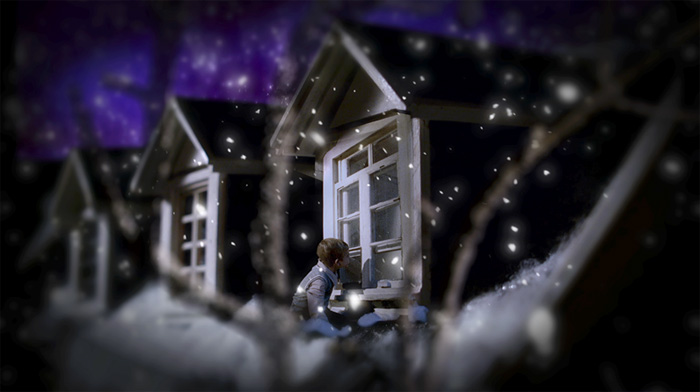
Ne crâne pas sois modeste [Keep a Modest Head] – 19 minutes
An intriguing concept on behalf of famed North American independent film director Deco Dawson, Ne crâne pas sois modeste [Keep a Modest Head] tells the life story of the last living member of the French Surrealists, Jean Benoît. By using archival footage of the artist in his studio and an audio recording of him telling tales of his insatiable libido and how it helped infer upon his art, the film becomes its own surrealistic work.
Dawson sets us on the cyclical loop of young Benoît (Brock MacGregor) and adult Benoît (Brent Neale) as they travel through the rooftop windows and moving picture frames of their reality-based counterpart’s life. We see examples of his work—although far too few—as well as representations of the sexual creature within. From high contrast black and white visages of a smoking, erect penis to the real Benoît looking at a naked woman’s genitalia “strictly for artistic purposes” (wink, wink) to his childhood voyeurism of the neighborhood girls, it’s unsurprising to find his entry into the artistic fraternity was aided by flirtations with André Breton‘s daughter.
An interesting look in the life of an original, I find it weird saying I felt the film went too overboard. The fact that it did should align itself perfectly with the subject matter and yet I discovered I was disappointed it was too much Dawson and not enough Benoît. Yes, Keep a Modest Head was created to speak on the surrealist’s life and not his art, but that fact doesn’t minimize my frustration.
C
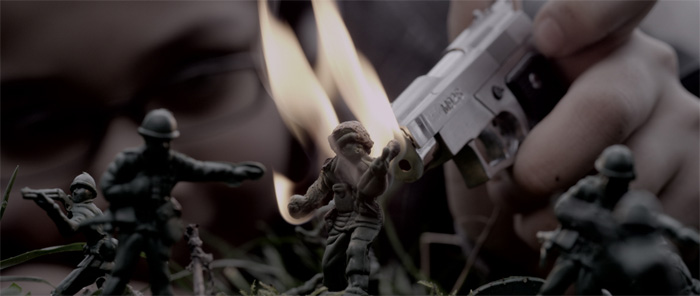
Lingo – 13 minutes
Writer/director Bahar Noorizadeh‘s short Lingo is an interesting film in that its viewers’ perceptions are everything. Reading the TIFF synopsis on the festival’s website explains it as what happens after a young Afghan immigrant sets a fire in his neighborhood. I disagree wholeheartedly that he was the cause.
I may be wrong—I guess the filmmaker is the only one who truly knows. But watching the very calculating cinematography makes it difficult for me to believe Ali’s (Farhad SarwariAlex Lasheras frame composition clearly shows him away from any structures before a girl at soccer practice first witnesses the tragedy.
Created as a commentary on Canada’s struggle with the language barrier of its immigrants—having an English or French-speaking person attempt Farsi must be insane when the language itself has so many dialects—the second half’s static shot of Ali’s mother Maryam (Shaima Eshan) perfectly embodies the issue. Trying desperately to understand the interrogator (Hossein Martin Fazeli), we witness her surprise as a routine witness statement turns into an accusation.
Say what you will about the problem, arguing two years is more than enough time to learn the language of the country you reside in is just as easy as saying the government shouldn’t let you in without having programs set up to teach it. Fault lies on both sides and excuses simply won’t solve anything when something as simple as confusing the word “set” with “see” can have disastrous effect.
B-
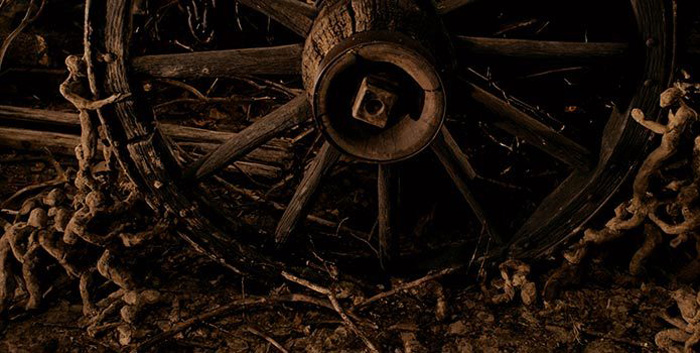
Bydlo – 9 minutes
While watching director Patrick Bouchard‘s and writer Cynthia Tremblay‘s stop-motion animated Bydlo, I couldn’t stop the Battlestar Galactica line “All this has happened before, and all this will happen again” from repeating inside my head. As water brings forth life and evolves into a war against the oppression of each opposing side, we see humanity falling pray to its baser instincts as competition supercedes compassion to let only destruction remain.
Inspired by a movement in Modest Mussorgsky‘s piano concerto Pictures at an Exhibition, Bydlo shows how tenuous life is if we don’t work together towards peace and harmony. As its solitary creature standing motionless amidst the carnage is ripped down by the chaos despite its want to avoid the hate, we see how futile it is to avoid the inevitable apocalypse. Even at the end when both sides are nothing but a shadow of once proud forces, the sun’s cleansing rays reward their victory with a quick, dehydrating death to recycle the earth for the dance to begin anew.
A highly expressionistic piece that mesmerizes with its rough, handcrafted aesthetic of mud-like monsters of aggression, the tumultuous battle for the power inherent in the wheel’s symbol of progress becomes amplified by the orchestral melody. Beautifully using the earth itself to spawn and consume creation, its hard not to feel something stir within you during the experience. Hopefully that emotive reaction will give you pause to acknowledge the sanctity of life and how quickly it can pass.
A-
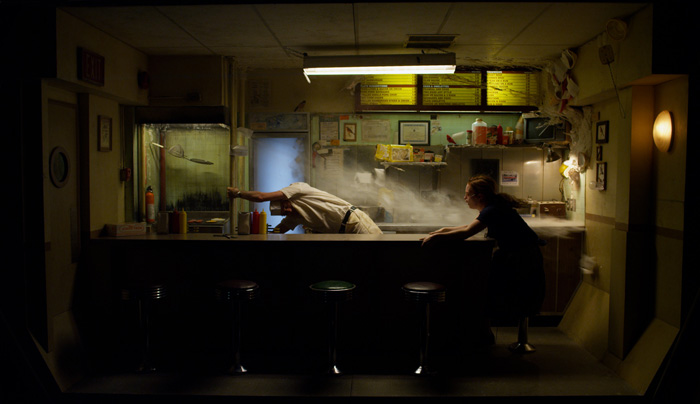
Malody – 12 minutes
A visual treat from Atom Egoyan‘s regular production designer Phillip Baker, Malody takes us into the surrealistic dream world of a sick woman coming to grips with her situation. Trapped inside her mind as the blips of a cardiac monitor set the beat, Malody (Alex Paxton-Beesley) begins to see herself as a young girl (Ashleigh Warren) carefully setting her up for a fall.
The majority of the film takes place inside a 24-hour diner as she takes a seat at the edge of the counter with only the barely audible voices of the cook (Thomas Hauff) and his last customer (Ryan Granville-Martin) discussing fishing lures. Possibly representations of the doctor and a brother/husband sitting inside her hospital room in the sort of routine malaise such things manifest, Malody’s deteriorating health coincides with the entire diner slowly spinning upside-down. As eggs, flour, and whatever else wasn’t fastened to its perch fly around the room, the unfazed cook mechanically makes his way over to verify what we have already inferred.
Metaphorically showing the brain create a world around what a dying woman cannot clearly see, the film also reveals its fabrication by zooming out to show how the diner is actually a set constructed inside a giant cylinder being rolled inside a studio. Life is a story built through our experiences as seen by our own eyes, the past constantly returning to superimpose itself on the present. And as we suspect the end of Malody’s journey has arrived, the idea her roller coaster of confusion may have been the medication working its way through her veins set in and life may yet have some time left.
B+
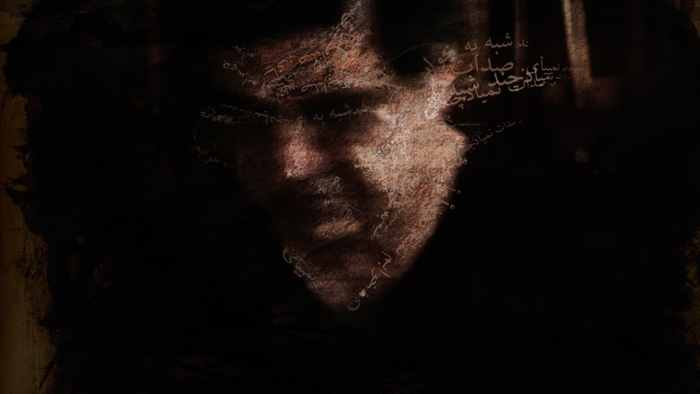
Joda [Apart] – 3 minutes
Very clearly wearing its political motivations on its sleeves Theodore Ushev‘s plea for the release of imprisoned Iranian filmmakers is a stunning work of art. Joda [Apart] utilizes rotoscoping techniques with Farsi text used to compose its imagery. Whether the savage brutality of the Green Wave protests or the art of Jafar Panahi and his films, the chalk-like animation on its coarsely textured background is broken only by words like “Hope”, “Torn”, and “Anguish”.
Admittedly, I am not well versed in everything happening with Panahi or the other oppressed Iranian moviemakers. But this ignorance doesn’t mean the impact of such a personal call for liberation is lost. Through the poetic words of Maral Mohammadian, Ushev’s rough depiction of atrocities past, and the delicate hand crafting Panahi’s The White Balloon as a sign for hope, one understands the tone and appreciates the sentiments.
Shed of its meaning and looked upon as simply a piece of visual art, one can’t deny its figurative use of language or the beauty of its form. Juxtaposing the harsh silhouettes of violence with the soft detail of a nation’s will to survive for freedom, we see how the emotional worth of art will always be stronger than the physical pain of abuse. Iran wouldn’t be silencing their political detractors if they didn’t believe this to be true.
B
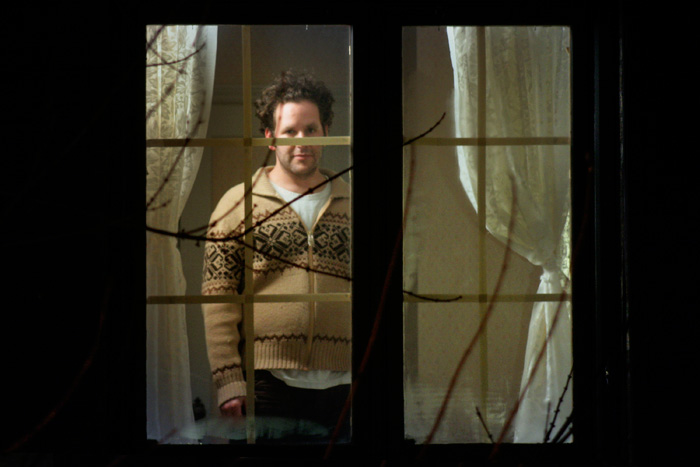
A Pretty Funny Story – 19 minutes
A cautionary tale for anyone who revels in using the misfortune of others to elicit laughs from co-workers at the water cooler, the ends may not justify the means if anyone like the uber-paranoid neighbor in Evan Morgan‘s A Pretty Funny Story actually exists.
More a testament to the writer/director’s acutely warped mind than anything else, his depiction of suburban boredom quickly becomes infused with an outside-the-box genre move towards thriller territory. Expecting a straight comedy from the start, the realization that the laughs will in fact be of the uncomfortable variety takes a little while to accept. Once you do, though, the film finds itself a mildly humorous escapade into the dark recesses of a pretty messed up individual.
Is having Rick (Justin Conley) tell his fellow cubicle residents about his neighbor’s wild dancing habits that bad? Should the victim in all of this (Jimi Shiag) care so much that he’d take the drastic measures he does in order to keep the family man and his wife (Erin Hickock) silent? Of course not—that’s the point. Morgan looks to subvert the embarrassment inherent with living way too close to others and the inevitability everyone will be caught in a compromising position at some point.
It’s a fun idea with overwrought performances making sure we over commit on our hypotheses about whether or not the stakes are real. For young Michael (Ezra Sherman), life has gotten a lot more complicated, but as long as no one pisses off the neighbor again all should be fine. Thankfully, Morgan does the right thing by testing to see what happens if someone does. The result may not fully redeem the somewhat tiresome premise, but the payoff definitely makes it worth your time.
C+
Short Cuts Canada Programme 1 plays at the Toronto International Film Festival on September 7th & 8th.
— Programme 1 – Programme 2 – Programme 3 —
— Programme 4 – Programme 5 – Programme 6 —
Programme 2
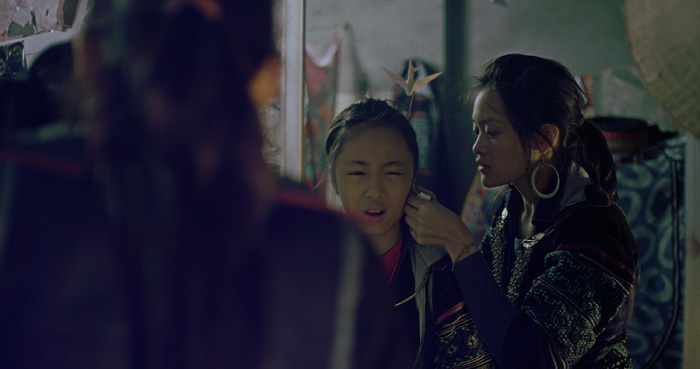
H’Mong Sisters – 13 minutes
Dealing with cultural differences and the sexualization of Third World inhabitants, Jeff Wong‘s H’mong Sisters will definitely open your eyes to the sad truths faced in foreign countries. Setting the film in the mountains of Vietnam, Wong shows how the poor indigenous tribes stop at nothing to accommodate tourists by showing them around in hopes of receiving money in return. But while Paj (Thùy Anh) is no longer naïve to the forward advances of Western visitors beyond buying trinkets for souvenirs, her sister three years her junior still is.
The dynamic between the two girls rapidly changes as the reality of their situation becomes clearer. For thirteen-year old Mu (Phùng Hoa Hoài Linh), the prospect of joining her sister on the streets can only be a fun, enjoyable experience if what she’s heard is true. So when their mark Jackson (Scott Dean) begins flirting with her instead of her older, chattier counterpart, you can’t blame the girl for feeling liked. What the child doesn’t understand, however, are the ulterior motives behind this kindness.
Shot with a sure hand and possessing some fantastically nuanced performances, H’mong Sisters exposes this brand of exploitation occurring throughout the world. These young girls find themselves working towards better tips, and better sales, but at what cost? Watching Anh’s final turn to the camera gives us our answer as Linh’s confusion reminds us about the innocence so many will easily take advantage of if presented the opportunity.
B+
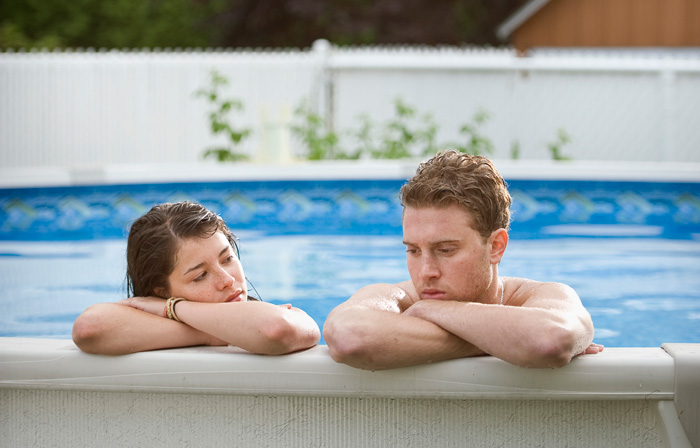
Faillir [Struggle] – 24 minutes
Controversial is a bit of an understatement when it comes to Sophie Dupuis‘ Faillir [Struggle]. Whether the French Canadian family depicted is as progressive this one or not, I’m not sure the level of sexual tension between siblings here will ever be fathomable. Yes, the physical competitiveness of brothers and sisters can be confused as the flirtations of young lovers to outsiders, but it shouldn’t necessarily be so to those bound by blood.
Ariane (Noémi Lira) and Simon (Antoine Paquin) nonchalantly occupying and using the bathroom where their mother (Sonia Vigneault) is still drying off in the tub can be construed as a comfortable family meet-up when compared to what’s coming. Close-knit and open to share their emotions and thoughts, this trio is completely transparent as Ariane readies to leave Val-d’Or for Montreal while the rest stay behind. So, when we see the siblings’ sad, hurt eyes as the other goes off with whatever conquest they have acquired, the realization a confrontation about these feelings will too be on its way.
For Dupuis, however, the taboo itself isn’t enough as she lets her characters act on emotions to bring tensions to a head in a scene made difficult to watch because of the knowledge we have about these two young, active kids’ relationship. She gives no easy answers and instead allows our personal reactions to what occurs serve as the final word on the subject. Lira and Paquin let a newfound awkwardness coexist with the never-changing love they have for one another in authentic performances that will have you second-guessing the improper exchange portrayed.
Are you a prude if you find Struggle off-putting or are a moral, sound human being? Dupuis will make you ask this question and figure out your stance on a subject no one wants to speak about. Whether you’re on one fence or the other, however, you can’t deny the power its subject matter holds or the internal conversation it breeds.
A
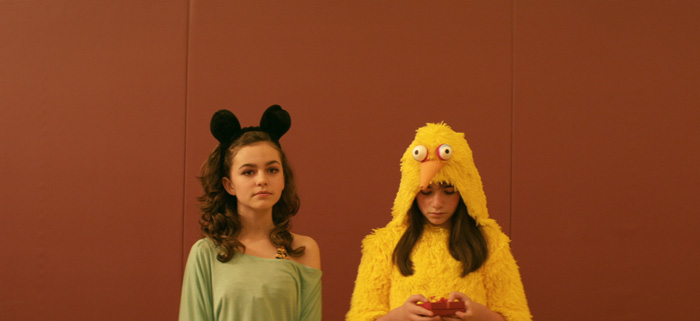
Life Doesn’t Frighten Me – 14 minutes
On the cusp of womanhood with only her grandfather and pet pug to help lead her through, birthday girl Esther Weary (Jade Aspros) was probably hoping for a better day. Between her Halloween costume resembling a piñata, ‘mean girl’ Gabby (Leah McPherson) proclaiming her ugly and big-nosed, and Richard (Oliver Ungar) the nerdy, allergy-ridden robot seeing her at her most vulnerable, arriving home to an eccentric guardian attempting to comfort with all the wrong words only increases her sense of isolation.
Stephen Patrick Dunn‘s Life Doesn’t Frighten Me is an endearing example of alternative families and the struggle to compensate when life’s changes occur without warning. There is a deadpan, Napoleon Dynamite-type tone to the first half—cemented by pop-up book end credits set to Sufjan Stevens—as Esther’s time at school exists as though in a dream. Both the tempo and emotion do pick up, though, once she comes home to King Henry the pug and Grandpa (Gordon Pinsent).
Quirky to a fault, Dunn has a firm handle on his message and scales back to allow his actors a level of authenticity when necessary. Aspros’ angst is perfectly forlorn and Pinsent’s misguided assistance to be mother and father at this delicate time is a great mix of humor and compassionate humility. Funny and relevant, the light atmosphere assists in making the subject matter accessible while the actors shine in the process.
B+
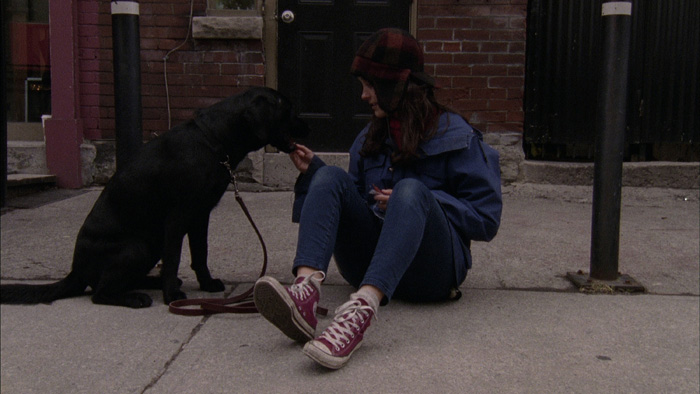
Tuesday – 14 minutes
Supposedly based on The Catcher in the Rye‘s Holden Caulfield’s younger sister Phoebe—which sadly means less to me than it should being almost two decades since I read it—Fantavious Fritz‘s Tuesday is a look into the drama of being a twentysomething. Saddled with two jobs and no time to sell her microwave, the titular character’s (Daiva Zalnieriunas) day is a series of mishaps. Unable to catch her breath without being told what she’s done wrong, fate is rarely kind.
There is a whimsical feel to Tuesday’s actions with an abundance of innocence and naivety doing little to help when trouble rears its head. Tilting her shoes as though Dorothy from The Wizard of Oz after she has lost one of the dogs in her care, we soon discover she never lets the bad moments define her life.
Happy-go-lucky despite the often depressed and manic look on her face when letting those around her down, the film feels like a sitcom at times. She is robbed, fired, and perpetually late for meetings and yet always chipper and optimistic as she is walking Bruce the dog down the street. There is a sense of immortality at play as though the negatives will always be met with a positive if surrender is refused. I guess being a twentysomething has that feeling in spades with the future still ahead and life’s lemons yet to have jaded the sunny disposition.
B-
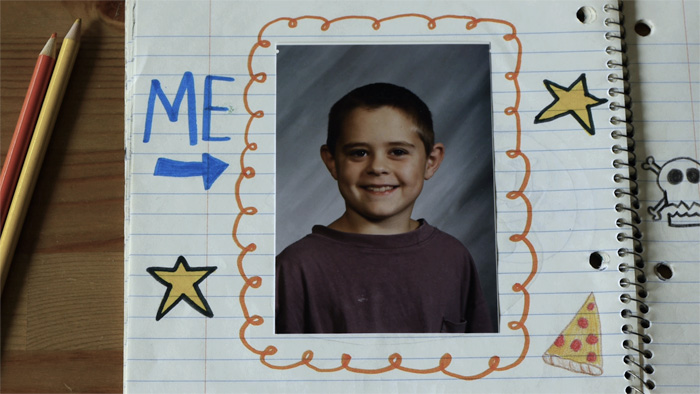
Asian Gangs – 9 minutes
Lewis Bennett and Calum MacLeod have crafted a perfect mix of comedy and hard facts for their documentary Asian Gangs. A look into a very real problem in and around the Vancouver area, Bennett’s utilization of an unexplainable memory helps to get us on the topic as well as have a little fun with it.
After a schoolyard tussle with his nemesis Chris Schroeder, the principal warned him to change his ways before finding himself in an Asian gang. As a Caucasian fifth grader in 1994, such a statement could be shrugged off without a second glance, but it’s unavoidable seventeen years later once his mother recalls the incident. So, by questioning his Asian friends Shauna and Jack, inquiring about his gang recruitment chances with Constable Doug Spencer, and reenacting the fight with Chris to see if the setting had something to do with the comment, Lewis humorously pokes fun at his manufactured ignorance.
The film does eventually find itself on a more serious road when talking to gang outreach worker Jonathan Wong, but even then the underlying comedy complements the message to facilitate memory with its hard-to-forget goofy nonsense. A fun gem hindered only by the participants’ occasionally looking as though they were coached or had preparation off-camera, Langley, British Columbia ends up looking like a pretty safe town to grow up in.
A-

Vive la Canadienne – 3 minutes
Don’t mess with a couple dancing through the park unless you want to risk getting your butt kicked. This is the impetus of the dance-fight at the center of Joe Cobden‘s Vive La Canadienne.
The writer/director himself and his cinematic love (Louise-Michel Jackson) are laughed at when happily leaping past a bench full of hooligans. After verbally telling them what she thinks of the mocking, Jackson removes her coat and shows the bullies exactly what she’s made of while Cobden watches in smitten delight like the old codgers spying the exchange on the fringe.
Set to the eponymous song—Canada’s original national anthem—this brawl is a delight to watch as gender roles reverse. Jackson defends the honor of her man and the two gleefully cavort through the park in love without a care in the world. I would too if my girlfriend could single-handedly dispatch a quintet of unsavory fellas with a few swift kicks.
B+
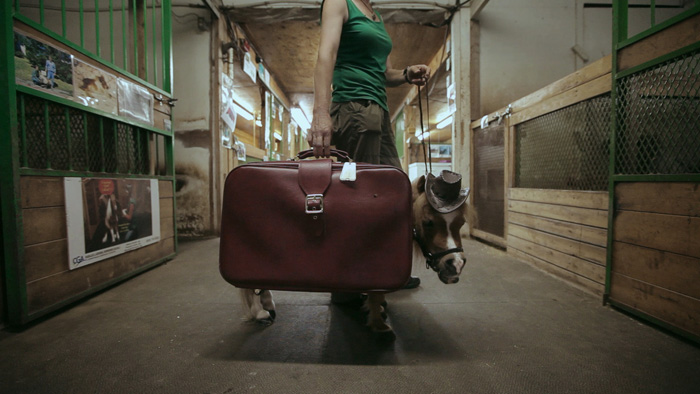
Nostradamos – 9 minutes
Unfortunately the screener DVD I received was missing the subtitles for this French-language short by Maxence Bradley, Elisabeth Tremblay, and Alexandre Lampron. The TIFF synopsis does sound intriguing, though, so hopefully I’ll be able to check it out in the future.
From Magail Simard:
“Blurring the line between documentary and fiction, Nostradamos takes place on the eve of the end of the world. As hordes of people flock to the city of Amos, Quebec after it is identified as the safest bet for survival in the face of the coming apocalypse, a number of local residents conspire to profit from the sudden influx of tourists.”
Short Cuts Canada Programme 2 plays at the Toronto International Film Festival on September 8th & 9th.
— Programme 1 – Programme 2 – Programme 3 —
— Programme 4 – Programme 5 – Programme 6 —
Programme 3
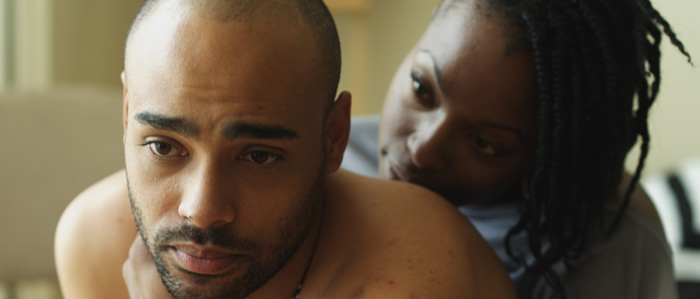
100 Musicians – 8 minutes
Based on the short story June by Dionne Brand, writer/director Charles Officer delves into perception and mindsets inside the bedroom. As two lovers come together after a prolonged distance apart, the feelings and closeness shared cannot be compared. But as a radio DJ (Helene Joy) begins to comment on Toronto’s new mayor’s declaration about wanting to hire more policemen, the two find their ideological wiring to be quite far apart indeed.
100 Musicians is constructed in such a way that we the audience knows exactly what Mayor Rob Ford said through archival footage of his speech and yet still plays with our acceptance of what we hear as truth. As the DJ attempts to get out her quote, Sydney (Rainbow Francks) turns down the volume or distorts the words with the whoosh of his balcony door. It’s therefore easy to side with her more levelheaded beau when June (Abena Malika) talks about how brilliant a proposal to hire more musicians for the city would be.
The film concerns more than the he said/she said ordeal or the mildly heated debate about optimism versus pessimism. Those aspects are relevant and do provide commentary on how citizens view big government and the arts as ways to prevent crime and make the streets safe. But what I found most compelling is the argument posited that while we hear we might not actually be listening. Our experiences are forever put through a filter of personal ideals, state of mind, and emotions so it’s easy to project who we are upon the truth. The key becomes accepting our faults and appreciating the humility of allowing the capacity to be wrong.
B
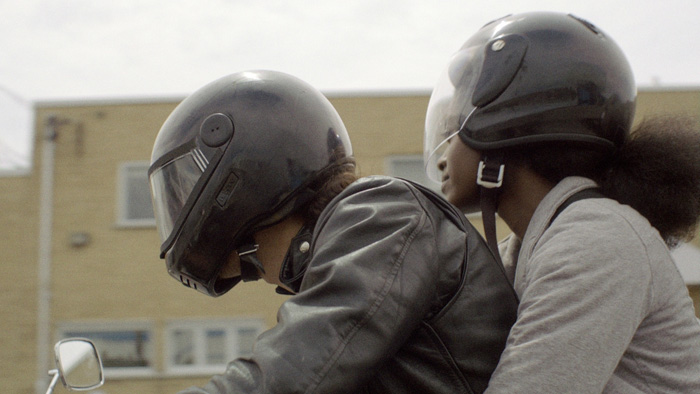
Avec Jeff à moto [With Jeff] – 15 minutes
Responsibilities shouldn’t define us, but they also shouldn’t be neglected. For Nydia (Laury Verdieu) they have been all she has ever known. A quiet girl comfortable with the fact she finds herself at home every night with chores and a book of poetry, the mere acknowledgement by a boy ends up turning her life upside. Marie-Ève Juste‘s Avec Jeff à moto [With Jeff] depicts this first brush with the desire to let loose.
Tasked to watch her brother Jackson (Brandon Pierre) while their mother goes on a date, the surprising proposition from classmate Jeff (Liridon Rashiti)—beholden to a reputation for being a womanizer—piques her interest enough to change her clothes, look, and unwavering mentality for doing what’s right. Hoping the brief motorcycle ride taken that morning was merely the beginning of something fun and spontaneous, the realization she may not even care whether it becomes more is both scary and freeing.
I’m not sure if With Jeff is meant share a “Be yourself” message or a “You only live once” call for action, but the way in which Verdieu opens herself up and accepts failure as an option is an admirable attribute. Less concerned by Nydia and Jeff’s potential date and more her willingness to break the mold and let the person she has kept trapped inside loose, the film finds itself exemplifying independence and the fact conservative representations of women are not gospel.
Contemplating the thought of not spending another night alone at home shows her capacity to live. Perhaps she’ll discover it isn’t what she wants after all, but she’ll never know without giving it a chance.
B
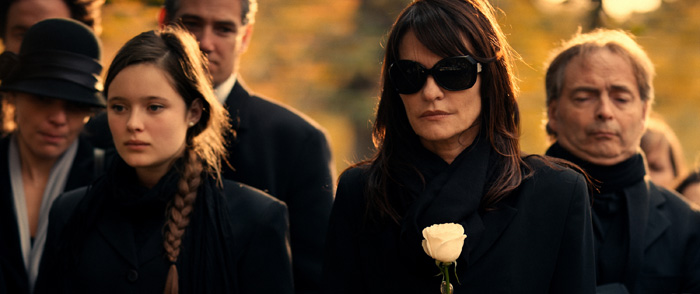
Reflexions – 5 minutes
I wanted to really love Martin Thibaudeau‘s Reflexions but its complex constructions attempting to be masked by a façade of simplicity is just way too manipulative. The idea is a clever one—flipping the kind words of love and honor from a eulogizing priest (Tony Robinow) with the dark realities of truth—but its use of reflective surfaces to invert meaning can’t be more contrived.
The music soars and swells to take us onto the journey through the deceased’s family, leading us down a path only visible through reflections because the director has chosen to take us there. I guess this is true for all works of art, but the great ones go beyond the surface desires of their maker. I have no room to infer, no ability to come to conclusions that differ from the person sitting next to me—the film’s plot is the be all end all and I don’t like that sort of impenetrable intellectual prison.
Nathalie Breuer‘s widow along with Marianne and Rosalie Fortier‘s sisters do well to say a lot with their stoic faces not quite holding back tears, but it’s really the make-up artists and wardrobe designers who do all the work when words are not at their disposal. The artifice is commendable, but the overall whole is hollow beneath that surface. Unfortunately I can’t forgive this one fatal flaw.
D

Model – 4 minutes
Devoid of words, Dylan Reibling‘s Model pits man versus machine inside the world of architecture in order to show how technology continues to replace human touch with cost effective precision. A comedic look at the insane level of artistry necessary to craft just one 3D building from foam with glue and X-ACTO knives, the rapid work of a computer melting and cooling plastic becomes too difficult to keep pace with.
All parts of the equation are represented—Mr. Jenkins’ (Kresimir Bosiljevac) thrifty business owner looking for the next best thing; Peter Pasyk‘s model maker history’s lost craftsman no longer able to enjoy job security due to a unique skill set; and Michael Thomas‘ turncoat architect toeing the company line to remain relevant as his old colleague is left to dissolve into the ether. This is the capitalistic dichotomy ever evolving within the changing tides by creating new, cheaper, and more effective products while transforming the indispensible into the expendable.
Cutely moving along the conveyor belt of progress with its mechanical, techno score and stark white sterility invaded by the color of the future, Model‘s actors use big expressions to give a silent movie-era aesthetic. Like that format’s eventual demise, we quickly learn everything can be improved. If we aren’t willing to also change accordingly, we’ll be left behind obsolete and alone.
C+
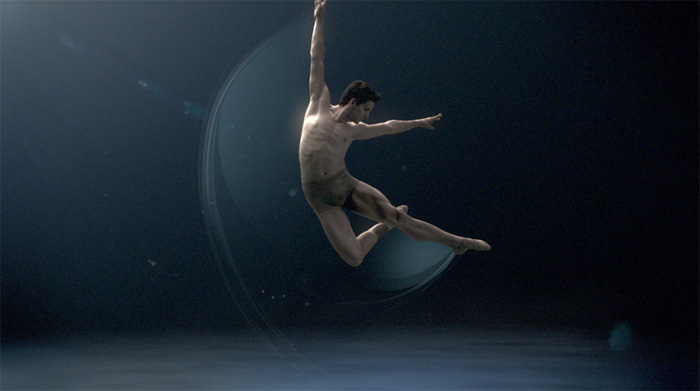
Lost in Motion – 3 minutes
Stripped of all artifice to capture the pure physicality of National Ballet of Canada principal dancer Guillaume Côté, Ben Shirinian‘s Lost in Motion portrays the intrinsic beauty of the human form and its capabilities.
Soaring through the air with the accompaniment of digital effects to enhance the out-of-this-world moves performed, this floor routine is gorgeously juxtaposed with a stirring instrumental score that hits you emotionally with the visuals. A filmed rendition of its star’s unparalleled skill, the piece showcases the artistic worth Canada’s dancers possess and the wonders within this tool we call the body.
B
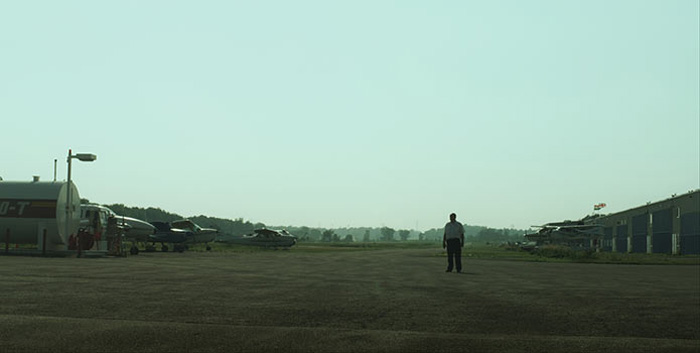
Le future proche [The Near Future] – 18 minutes
We all use our jobs as an escape from personal lives rife with tragedy and hardship. Through the routine of daily exercises and the structure of schedules and deadlines we are able to exist in an objective world devoid of the problems we know we must meet head-on afterwards. For Robin (Patrice Berthomier), this reprieve from the reality of life and death comes in the form of sailing the skies to a steady drone of an engine while sadness is left behind.
Co-written by Madeleine David, Sophie Goyette‘s Le future proche [The Near Future] takes us on a journey of the heart as the internal musings of its central pilot are heard against the monotonous, unimportant activities surrounding him. Flying for radio personalities disseminating traffic patterns, couples on their anniversaries, and students learning to take the yoke and soar, the machinations of his craft help alleviate the feelings building inside once discovering tragic news by phone. The voices and laughter of strangers passing throughout the day become white noise to distract from memory.
Pretty landscapes and aerial views are seen as more than just picture perfect vistas; they are the sights only witnessed when traveling above the worry of humanity. Above everything that can cause pain, suffering, joy, and happiness, Robin lives in the serenity of the heavens. Contemplative and sorrowful, finishing a long day at the office won’t erase what has happened. It will, however, let him process it amidst normalcy as the breakdown to come waits in the wings.
B
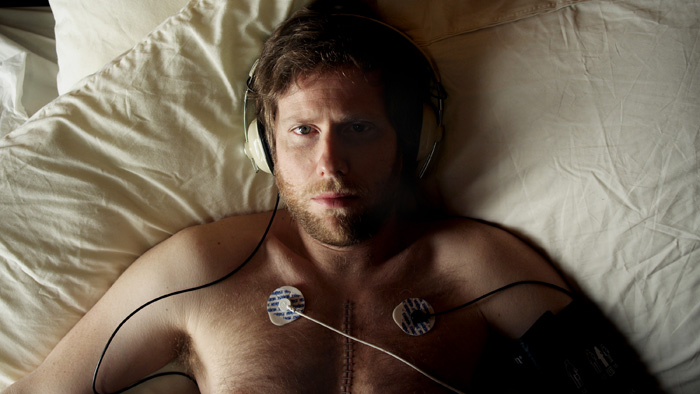
Broken Heart Syndrome – 16 minutes
A comedic manifestation of a broken heart as fatal disease, Dusty Mancinelli infuses a quirky bit of humor into the all-powerful soul crushing human ailment we call love. His Broken Heart Syndrome transforms our mental anguish into medicinal side effects and the faux seriousness of the psychological pain inherent to love being ripped away into a bona fide illness. Russ (Jim Annan) cannot deal with the reality of his girlfriend Carol’s (Joanna Douglas) betrayal and tries any means necessary to uncover a cure of his life-crippling ailment.
Full of comedic set-pieces like projectile vomit into a child’s face and the off-beat eccentricity of his doctors played by Christian Lloyd and Allen Stewart-Coates, the film tries hard to go for broke with its concept by actualizing the intangible. Mancinelli takes us through the stages of heartache as Russ’ sickness makes its way towards depression, anger, unbearable pain, and the hope for acceptance as the time since his break-up continues to increase. His hyper-real delusions project themselves onto reality as his reactions to them ruin his life even more.
An inventive charade to give meaning to our rite of passage through love, its process is a cute construct with which to laugh at ourselves for having experienced the same unexplainable angst. Annan’s subtle everyman allows us to enter the work by remembering when we too were in his shoes, battered and beaten by our body’s willingness to wreak havoc as a result of our mind’s refusal to move on. The events are hopefully more dramatic than our own personal histories while the laughter they bring helps soothe the soul and ease the pain for the next heartache.
B-
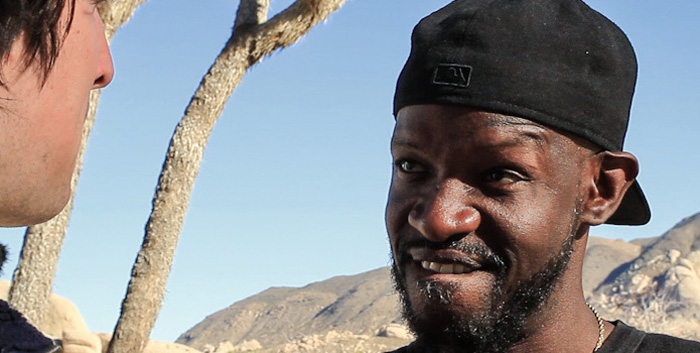
Crackin’ Down Hard – 10 minutes
Leave it to Trailer Park Boys creator Mike Clattenberg to find a way to get prostitutes into the desert. Co-written by star Nicolas Wright, Crackin’ Down Hard brings its director’s derisively crude humor to the masses via a young man (Wright) looking for some quiet meditation and the pimp (Yoursie Thomas) who cajoles him down to partake in a little extracurricular activity.
Off-the-wall every step of the way, watching the two men’s back and forth as Steve cons Terry from his perch to get a glimpse of his female merchandise is a riot. Arguing about manners, race, and the sanctity of privacy, it doesn’t take long before Wright’s character gives into his baser desires and accepts his dumb luck at stumbling upon an oasis of sexual experimentation.
Where the film ultimately goes will surprise you as its seemingly random progression continues its odd trajectory down into the depths of inappropriate behavior. There is definitely a resemblance to Julian and Ricky’s misadventures in Clattenburg’s old Showcase series and any fan of the trailer park should find himself having a good time in Steve the Pimp’s accommodating hands.
B
Short Cuts Canada Programme 3 plays at the Toronto International Film Festival on September 10th & 11th.
— Programme 1 – Programme 2 – Programme 3 —
— Programme 4 – Programme 5 – Programme 6 —
Programme 4

Frost – 13 minutes
Think The Village meets a futuristic 1984 dystopia and you’ll come close to what visual effects artist Jeremy Ball delivers in his stylish sci-fi thriller Frost. Set in the Arctic within a small tribe desperate for the necessary food with which to sustain their dwindling numbers, Naya (Emily Piggford) must watch as her father (Oscar Hsu) all but gives into the reality that the meat on their table could be their final meal.
Unwilling to surrender, the young girl looks to prove her might by traveling beyond the barrier of their ancestral grounds to find sustenance and the means to bolster their waning hope. But as she reaches the crest of a large ridge, what she discovers on the outskirts is an impossible expanse of a dead, icy world she cannot possibly understand. Trained to fight animals, the foe she encounters is a ruthless monster she may not be able to defeat. With no other options and a starving family back home, however, she has no choice but to try.
A bit heavy-handed in Naya’s cyclical, metaphorical narration, the visual splendor on display is that of a big budget Hollywood adventure into a post apocalyptic world. The art direction and special effects are seamless in their integration and Ball’s characters exist detached from civilization both figuratively and literally. Life must go on no matter the time, place, or people as survival finds you staring down your fear to journey into the unknown.
A-
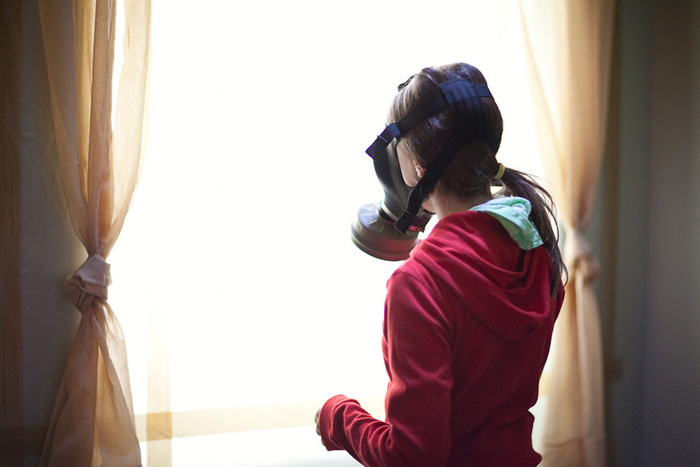
Safe Room – 5 minutes
A heartbreaking account of war through the eyes of a child, Elizabeth Lazebnik‘s short fictionalized account of her time hiding with her parents and dog Mishka during the Gulf War gives us a personalized account of the horror. Trapped inside the Safe Room of its title with gas masks firmly secured, this Russian trio must bide their time in Israel amidst the chemical attacks until they can find safe passage to Canada.
Dealing with a young girl’s naivety to the stakes at play, the film’s climactic moment of the parents desperately trying to keep their daughter’s mask on as she attempts to put it on her pet shows how precious the innocence of a child can be. As worried about Mishka as the adults were for her, what started out as a ‘fun’, mysterious game of staying together in the dark with their flashlights became real as though with the flip of a switch.
We take youth for granted and assume our children are left untouched by the horrors outside our doors. But they are a perceptive lot with as many emotions and feelings of responsibility as us. War is a concept we still pray will be eradicated, but its presence in our world must not be taken lightly or ignored especially for the sake of those too young to fully comprehend it.
B
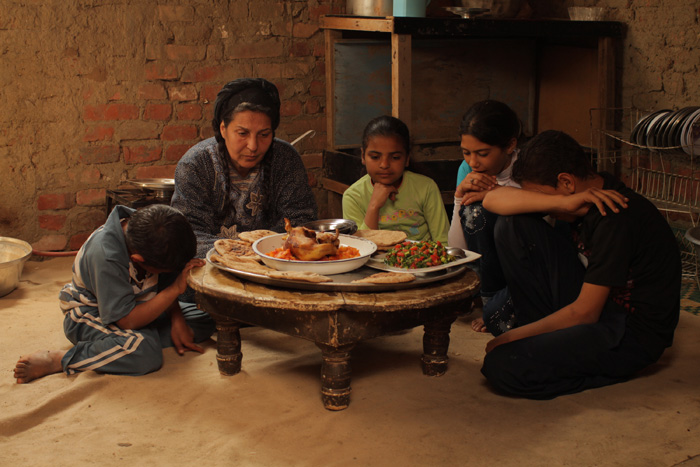
Waleematehorn [Their Feast] – 20 minutes
Looking to put the new Egypt—post 2011 revolution and the deposing of Hosni Mubarak—onscreen, Reem Morsi‘s Waleematehom [Their Feast] focuses on a poor family who’s eldest son Ahmed (Ramy Azzazzy) is finally coming home after serving time unjustly as a political prisoner. Following his brothers Shawky (Mahmoud Gaber) and Yahya (Shaaban El Sayed) as they search for the welcome home meal’s centerpiece, we see how much has changed and how much hasn’t.
The family’s matriarch Amaal (Hanan Youssef) works day and night to support her four children without a husband and sees little help. Friends who would can barely afford to survive themselves and those who can want too much in return. Some appreciate the nationalistic approach taken in the revolution and find themselves willing to make concessions while those unaffected remain coarse and entitled. And along with everything that occurs, the reality is that the prisoner returning may be but a shadow of the man who left.
Morsi’s message is sound and the look inside an Egyptian family becoming whole again comes with intriguing baggage as the children who remained became spoiled without the discipline of a man in the house. Unfortunately, no matter the goals of the story, it’s hard to truly give into the film because of its rather amateurish acting. Screaming appears to be the only level of emotion possible as demeanors also change quickly when suits the script. Naturalism in environment and detail becomes rather useless when the performances cannot keep up.
C
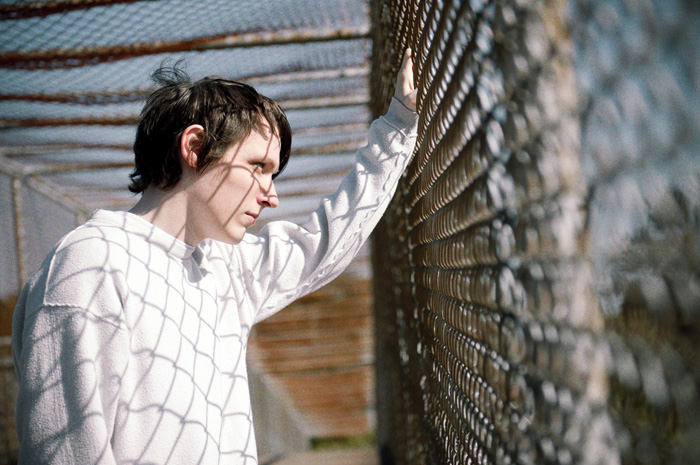
When You Sleep – 12 minutes
Grimy and disgusting living quarters are what Jessie (Eve Harlow) wakes up to. Flypaper hanging from the ceiling is above occupancy, dirty dishes have mounted, and the stove appears to have a full meal’s worth of dried and crusty food around its burners. But it’s probably the only thing she and boyfriend Lee (Winston De Giobbi) can afford at such an early stage of their adulthood. The mounting tensions of life, responsibility, and love are spiraling down into an abyss of what ifs and decisions gone wrong.
There is an unspoken elephant in the room as we see the couple abruptly and discourteously dismiss each other with a surface vitriol hiding the real issue at hand. Kids themselves, the prospect of moving forward into a future that’s supposed to house the good ol’ white picket fence and diapered babies gleefully rolling around in the yard is a virtual impossibility when looking at where they are now. And when a rat turns up in the bathroom, initial fear turns to anger as pent up rage allows its destruction to become the perfect outlet for over-flowing frustration.
Writer/director Ashley McKenzie‘s When You Sleep creates an aesthetic of squalor for which its characters must awaken within to acknowledge its metaphorical mirroring of the lives they have been living. With internalized anger brimming, De Giobbi and Harlow take us into their darkening souls lost without answers for a future they can no longer avoid. It’s a gritty look into the psyche of a young couple on the cusp of implosion and the choices we all must make when life becomes more than a journey of one.
B-
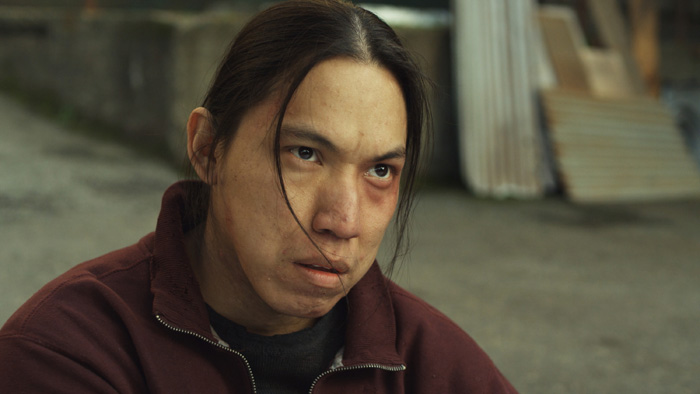
The Dancing Cop – 7 minutes
A pointed satire on the state of race relations where it concerns the Canadian police force and the First Nations Aboriginal people living amongst them, Kelvin Redvers‘ The Dancing Cop shows public bias and its all too normal willingness to look the other way.
When Wallace the cop (Mikal Grant) catches Travers (William Belleau) running from a convenient store as the clerk (Ranjit Samra) chases behind, the assumption of a crime leads him to follow with a highly aggressive bent. Refusing to listen to the man’s pleas that he did nothing wrong, the brutality ensuing is sadly unsurprising. Over-zealous cops are a staple in every nation and the fact they wield their power unchecked has become a common scene we’ve all numbed ourselves towards.
Only when Wallace breaks out into a full song and dance number (with lyrics by Alexandra Staseson) do we question his motivations, realizing how we let our ‘protectors’ get away with anything. The absurdity of the situation brings with it this clarity and yet it’s hard to think change will occur anytime soon. Authoritative uniforms will always be seen as more credible than a marginalized minority no matter the truth. It’s a flaw of society and one power-hungry men have prayed upon for centuries.
B
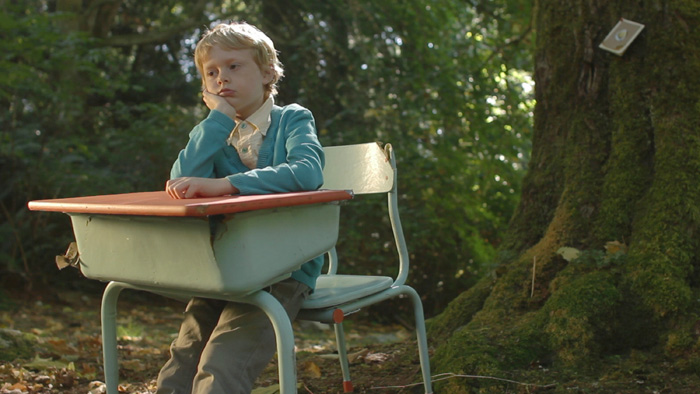
The Worst Day Ever – 12 minutes
Poor Bernard (Jakob Davies)—the universe is simply not his fan. Cute and precocious to a fault, this boy will do whatever is necessary to make sure he isn’t a disappointment to those around him. On this fateful day, however, we discover just what the world thinks of him as a chaotic mess of events comes raining down.
Sophie Jarvis‘ stylized fantasy The Worst Day Ever shows how the filter of a child’s eyes is not always full of rosy optimism. They pick up subtleties in adults and find themselves taking the blame when tragedy strikes. Needing approval and a sense of belonging, watching Bernard’s parents divorce (Iris Paluly and Ingo Holst), teacher expel him (Helen Camisa), and neighbors shake their head in disgust when walking by only adds to the feelings of isolation Davies’ highly expressive face has been projecting.
Darkly comic in the best way, Bernard’s misfortunes escalate as the day goes by to make him feel even smaller than his short stature already does. Portraying how emotional and adorably innocent children can be, the film truly gets at the heart of life from their point of view. A tiny blip in the fabric of happiness can appear an earthquake of monumental proportions, so just think what a major incident like being the reason your entire house was cleaned out by robbers can do.
A
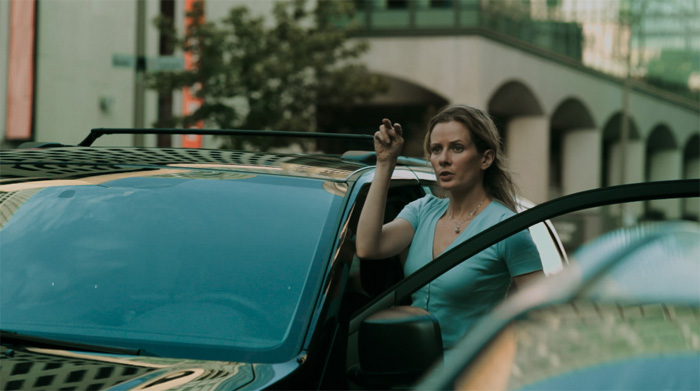
Sullivan’s Applicant – 12 minutes
It’s interesting to note that Jeanne Leblanc‘s Sullivan’s Applicant is part of a larger project about the city of Montreal and its myriad corners. I’m not sure this is necessarily relevant towards enjoying the piece on its own—the Toronto International Film Festival obviously didn’t—but it does go far in showing how Leblanc and writer Kevin Coughlin went about preparing their entry.
The opening monologue by Lucy (Judith Baribeau) says it all when she attempts to calculate how much of our lives on average are spent waiting in a car because of traffic. It’s a simple conceit and yet it allows the filmmakers to put their camera in the heart of the city and show it how so many experience it through their vehicle’s windows. More than this, however, the film is also about humanity’s drive for success and the disregard for details happening around them when without meaning towards their ultimate mission. Sometimes you just need to stop, take a breath, and reassess exactly what it is you want.
The dialogue here is fun as Lucy gets berated by her over-bearing mother (Suzannah Lehir) and discovers a stranger with the kind of similar sense of humor you don’t often find. Clicking wholly with the man in the car next to her (Graham Cuthbertson), Sullivan’s Applicant ends up less about getting to a job interview and more about understanding one’s heart and desires. We all need to stop and smell the roses to be able to catch those moments that will change our lives forever and Montreal like all cities possesses the nooks and crannies with which to discover them when you least expect it.
A
Short Cuts Canada Programme 4 plays at the Toronto International Film Festival on September 11th & 12th.
— Programme 1 – Programme 2 – Programme 3 —
— Programme 4 – Programme 5 – Programme 6 —
Programme 5
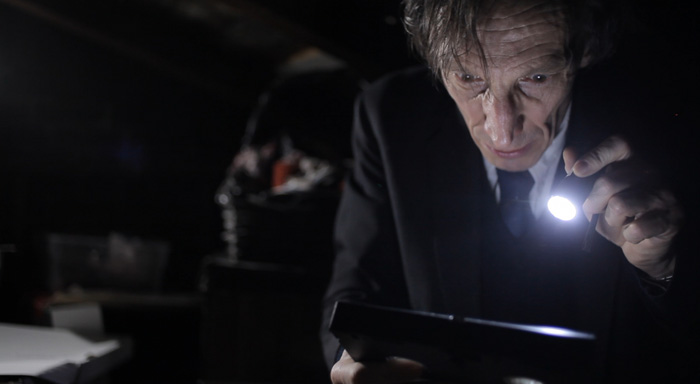
The Tape – 6 minutes
As the years move on and technology advances, it’s easy to forget that our most cherished memories may be tied to obsolete archives. For Jack (Julian Richings), his search to find one of these moments thought immortalized forever ends in the rather sobering realization time has passed him by.
Matt Sadowski‘s The Tape is both light-heartedly funny and sentimentally heart-warming. When Jack finally gets his hands on the object of his desire in a cluttered, box-filled attic, the recognition that he has no way of watching an old VHS tape hits him with the dumb-founded glory you can expect. Journeying for an elusive VCR, he encounters a new generation of digital age connoisseurs and a litany of like-minded souls who had either trashed or given away their one link to his past too.
We know the contents of the celluloid must be of great importance and thus hope the pawnshop owner (Shawn Lawrence) approached for a favor will acquiesce without the need for monetary retribution. And in a final scene of bliss we’re reminded of humanity’s ability for compassion and the wonderful gift of technology that both enhances our lives and keeps us grounded with the memory of what was. A love song to an age now almost completely wiped clean, The Tape also shows how nothing ever truly dies.
B+
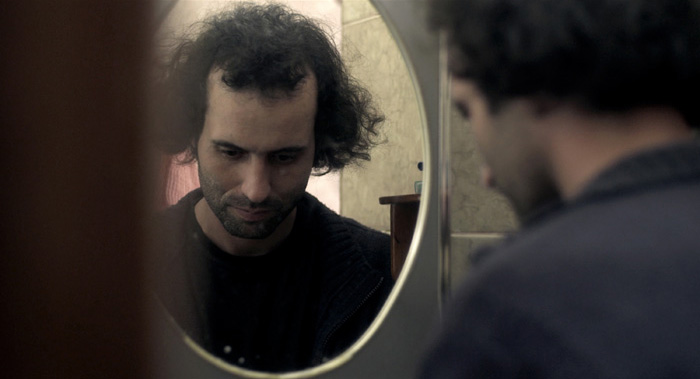
O Genio de Quintino [The Genius from Quintino] – 14 minutes
Able to fix anything mechanical that comes across his path, Ricardo (Ricardo Lima) is lost where it concerns his heart. Something happened to this neighborhood genius in the past that we aren’t privy to, but we can hypothesize from an over-protective mother (Benigna Dias) and her redacted photo album that his life before contained aspects she no longer wishes him to remember.
Happy to live in a daze fixing things at the mechanic shop where he works, it’s only when a young boy (Pedro Henrique Nery) arrives with a broken toy that he discovers the possibility for more. This damaged soul at the center of O Genio de Quintino [The Genius from Quintino] just isn’t ready to open wounds that weren’t there hours previously. He—like us—can infer upon the boy’s real reason for wanting to meet him, but the ability to reconcile the feelings accompanying it needs time to manifest.
Johnny Ma and co-writer Miguel Silveira have crafted a touching piece about familial bond breaking through any obstacles in its path. With wonderful performances by its two leads, we watch Nery and Lima cautiously size each other up and purposefully hold back in hopes the other makes the first move. Lost memories thought deleted forever return in a flood of emotion as the man who can fix anything finally discovers he may be able to fix himself after all.
B+
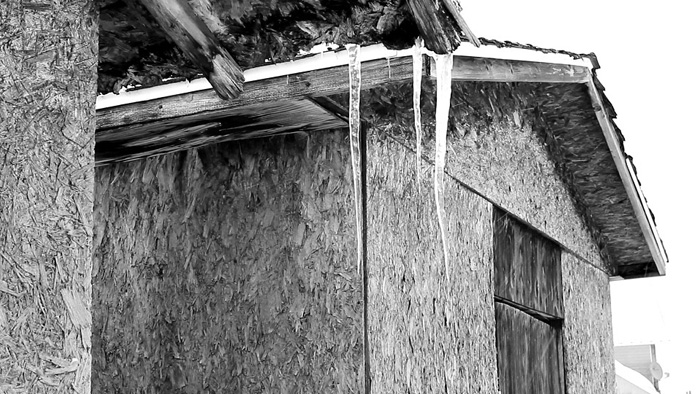
Aci ni micta cikateriten [I’m Beginning to Miss You] – 3 minutes
A poetic plea for any information Manawan, Quebec residents may have about the disappearance of his brother Pinaskin, Sakay Ottawa‘s Aci ni micta cikateriten’s [I’m Beginning to Miss You] imagery cross-cuts between the darkness of despair and light of hope.
Shot and narrated by Sakay, the film alternates between staccato poetry and the few details known about the last day anyone saw his brother. The black night shots screaming down an icy highway with headlights passing by portrays the chaotic emotional turmoil perfectly while the zoomed out landscape shots of snowy fields and barren birch trees holds the possibility he may come walking up the center of the frame at any time.
Artistically composed with the last glimpses of civilization Pinaskin would have seen before disappearing, they’re displayed not as clues but a representation of the often-overlooked beauty life has to offer. They are scenes of starkly white hope to be filled again by the colorful smile of a man never forgotten.
B-

L’Aubade – 2 minutes
Taking the final two-minute goodbye of a dying man (writer Arnaud Kamphuis) and juxtaposing it with the clinical, engraved diagrams from a century’s old medical school textbook is an inspired artistic decision. The high contrast white lines on pitch black race by as the words move from death to the afterlife and nothingness to rebirth.
Carla Susanto‘s L’Aubade becomes a powerful representation of our comprehension and acceptance of something like cancer stealing life away. From the slowly falling scribbles reminiscent of snowflakes to treed landscapes made from drawings of cells to fetuses traveling on a fast-moving train, allegory becomes a huge part of interpreting the film.
The aesthetic should overpower the whole due to its jarring pastiche of reused etches if not for the quick pace of its flicker. Detail becomes tough to grasp without pausing to catch everything that’s going on. So only select frames have time to burn into your mind, combining with the words and forming a fantastical world holding the infinite possibilities of death.
B-
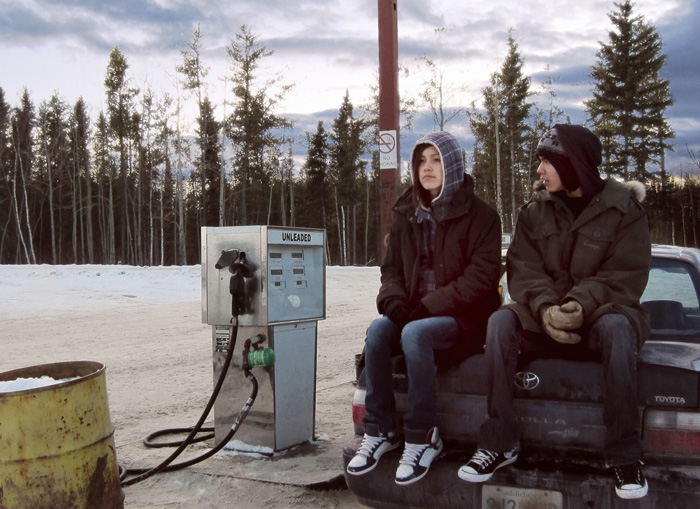
Barefoot – 11 minutes
I think Danis Goulet‘s short Barefoot is lost on me. I’m not sure if it’s a cultural divide or a philosophical one, but I just don’t understand the premise or what the lead girl Alyssa (Emily Roberts) thought would happen once her pregnancy is made public.
Perhaps this is the point of the film, though, and I’m simply missing it. Taking place inside a tightly-knit Cree community of northern Canada, the societal pressures to have children appear incalculable amongst parents and children alike. Pregnancy at sixteen is the norm and Alyssa yearns to join her friends preparing to begin motherhood. But as her bout with morning sickness spreads like wildfire throughout the school, the reality of such a major step in her life begins to unravel.
Goulet lingers on her lead for the duration and to good effect with quick cuts to home, school, and boyfriend Brandon (Cole Ballantyne). The confusion about what to do next is palpable and Roberts embodies the character’s impossible situation beautifully, but I can’t help ask why she put herself in that position? Lies beget lies and the whole situation spirals out of control as life moves on around her too fast. And with little resolution, the film feels unfinished to me. Maybe the unspoken conclusion speaks to those aware of the issue at hand, but it just left me cold.
C

Old Growth – 5 minutes
With the sort of poetic visual compositions reserved for a Terrence Malick opus, Tess Girard‘s Old Growth takes us into the cold to see nature’s long-standing accord with man. Through blowing snow over the gentle bevel of road cutting through a flat plain of land, Joseph Noth‘s woodsman rolls his wheelbarrow down to acquire his winter firewood. With each cut into the bark’s flesh the reappropriated wedge becomes riddled by markings to continue a long-standing tradition man has shared with trees over the millennia.
Lingering on the graceful slopes of tall grass waving, the machinations of a giant oilrig twirling its arm slowly through the sky, and Noth’s own measured strokes of an ax, Girard captures the wide expanse and how it complements mankind without being overtaken. Unlike a cityscape where nature is all but extinguished, we see this woodsman as a man of honor and integrity respecting the gifts the earth has given us and taking only what he needs.
B
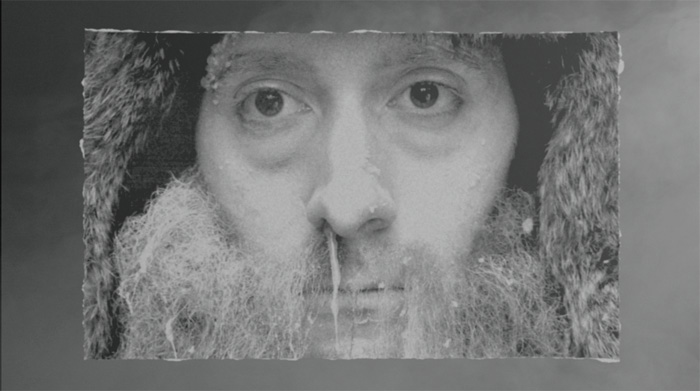
Let the Daylight into the Swamp – 35 minutes
The story of writer/director Jeffrey St. Jules‘ ancestry is one of unfortunate circumstances. Being able to recall his grandparents only through photos—a single shot taken at a time when he was alive—the tragic tale of two young lovers leaving their five children to a convent and relatives is told. With little evidence existing to guess at the why, what’s infer from a saved letter is that Helene could no longer be a wife and mother and Donal was unable to care for the kids himself as a result.
Looking to discover some tangible reason, St. Jules crafts this three-part documentary to at least recreate the emotions if not the details of his family breaking apart. Let the Daylight Into the Swamp‘s triptych shares the little history found about his grandparents (Mythology), the scattered recollections of his father barely old enough to remember them when they left (Memory), and the turmoil of strangers who made the same decision so their own children could grow up with a chance at a better, more loving life (Documentary). Told via photos, animation, reenactments, audio recordings, and interviews, the film becomes more than just about the St. Jules family as its clinical study sheds light upon mankind’s universal need for love.
There is a happy-go-lucky humor to the opening third as torn paper frames and old-timey filters lend themselves well to its 3D presentation. The joy of a facsimile Helene (Colombe Demers) and Donal (Pierre Simpson) appears impervious to the world’s harsh realities until the decision to build their family proves ill conceived. A sad tale of love lost that can never be justified or explained, this cathartic reminder is at its best with St. Jules’ father’s heartfelt remembrances and the non-actors sharing a pain they still feel today. Unshakably powerful, this tragic tale will stay with you well after the credits roll.
A-
Short Cuts Canada Programme 5 plays at the Toronto International Film Festival on September 12th & 13th.
— Programme 1 – Programme 2 – Programme 3 —
— Programme 4 – Programme 5 – Programme 6 —
Programme 6

How to be Deadly – 15 minutes
Newfoundland’s own unfortunate miscreants in the vein of Nova Scotia’s Trailer Park Boys, Donnie Dumphy (Leon Parsons) and friends have made the jump from skateboard video cut scenes to YouTube sensation to the Toronto International Film Festival. Written by Edward Riche and co-character creator/director Nik Sexton, How to be Deadly is a laugh riot of drug culture, crude humor, and imbecilic minds.
With his best friend Ronnie (for some reason he was left off the credits so I don’t know who plays him), on and off again girlfriend Brenda (Gina Squires), and the rest of the gang in St. John’s, Dumphy takes us on a tour of his unique life as a lay-about moocher. He’ll steal ‘shrooms from kids, con his social worker into giving him 600 pills of Ritalin a month, and do just about anything to keep his life as exciting and ‘deadly’ as he can. So when the prospect of joining a dirt bike competition has him looking for the $200 entry fee, he and Ronnie start hatching plans.
Complete with its almost indecipherable Newfoundland accent and lingo, the film will have you laughing straight through if you’re willing to give into the gag and let Dumphy do his thing. Interspersed with interviews a la TPB, we get an inside glimpse of the supporting players and realize there is definitely enough material to make their adventures into a regular show. I’m not sure if the world needs another low-income screw-up and his antics, but the phenomenon is definitely gaining traction.
B
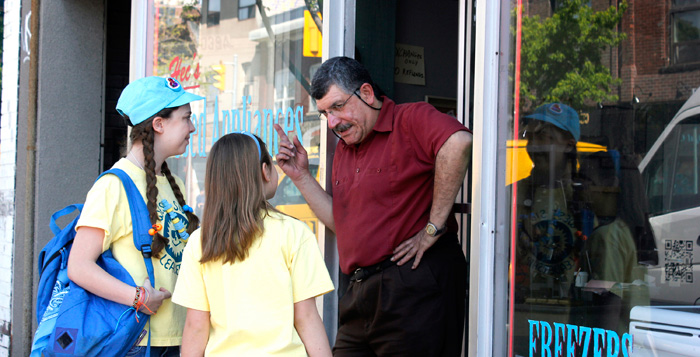
Dear Scavengers – 9 minutes
Thickly-accented and utterly no-nonsense, Hector (Hrant Alianak) doesn’t like when customers come into his used appliance store let alone tween girls with no inclination or ability to buy. He has stoves, fridges, washers, and dryers—they do the job they were meant for so don’t bother asking any granola-munching questions like, “which ones are energy efficient”. Hector believes he is providing a service, you either want one or you don’t.
Aaron Phelan‘s Dear Scavengers looks to change this stubborn man’s ways by introducing a slew of kids on a summer camp sponsored scavenger hunt around the city. Testing his patience by counting stoves instead of pulling out credit cards, Hector goes so far as to almost put up a “No Girls” sign a la an 8-year old boy’s treehouse. The problem isn’t all his—although being the adult does place blame firmly his way—because the girls don’t seem too keen on finding a compromise between their disparate cultural etiquettes either. Until, that is, young Abby (Helen Colliander) shows the mental fortitude to instill change.
An endearing comedy about the chasm between age and culture, Phelan does a good job developing his characters in a short period of time so that the change from start to finish isn’t only convenient to the plot but also completely believable. Customers here and in Canada want social niceties from their storeowners—it’s fun to see the fearless precociousness of a twelve-year old be the one to explain as much.
B

Chef de meute [Herd Leader] – 13 minutes
Man’s best friend—the term means more than just a constant companion when feeling blue. A pet can also teach you responsibility and how to command action in your life. One cannot be unsure when trying to control an animal; he/she must stand up straight and prove to be the Chef de meute [Herd Leader].
A cute gem, Chloe Robichaud‘s commentary on the passivity of people pretending to be independent when in fact they are truly lonely breeds meaning from tragedy. After inheriting her spinster aunt’s pug, Clara (Ève Duranceau) finds it difficult to get used to someone(thing) being around when the quietness of isolation had kept her warm for so long. Hoping to learn how to control the dog and prove she isn’t a lost cause, a trip to the park shows the simplicity of life and the dangers of being too comfortable.
Darkly comic in its climactic moment, the film surprisingly finds itself much more interesting than initially letting on. With a dour central performance slowly thawing to the joys of letting love into her heart, we learn that we all need a bit of backbone to stand up for ourselves and be who we want to be. Besides that, though, we also learn why not to stick your head out the car window while driving.
B
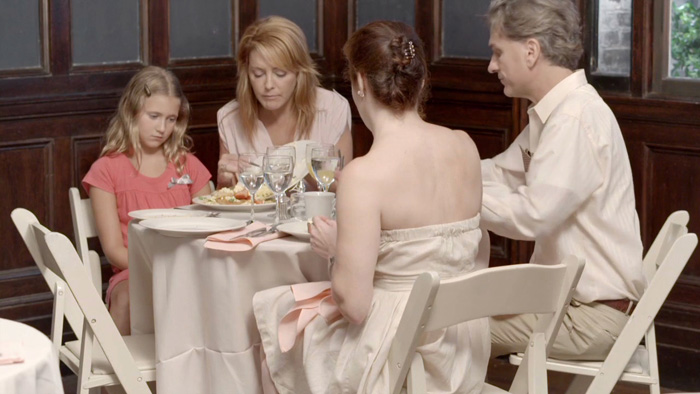
American Sisyphus – 7 minutes
Ah the futility of elitism and the gluttony of the First World—these are our two main exports. We live in a world of excess that is difficult to escape; the children untouched yet by the horrors of power and greed our only chance at salvation. But like the Greek king pushing his boulder up a hill in perpetuity, the cycle may never be broken as future generations only fall prey to the hubris of the ones before and existence finds itself speeding up on its course towards oblivion.
American Sisyphus, directed by Frieda Luk and written by Noah Pritzer looks into this problem by showcasing a mother infatuated by the empty regurgitation of misread headlines on the internet, a father caught in the tractor beam of the all you can eat buffet, and their daughter desperate to escape. Aleksandra Myrna is society’s last chance at breaking the chain, telling mom she’s bored and dad to return to the table to no avail. Trying her best to move on and excel despite our body’s love of sloth, seeing the fake laughter and sweaty mass of obesity around her will make you stop and look in the mirror. If you aren’t the little girl putting a wrench in the system, you’re one of the many fueling the flame while civilization crumbles.
B-
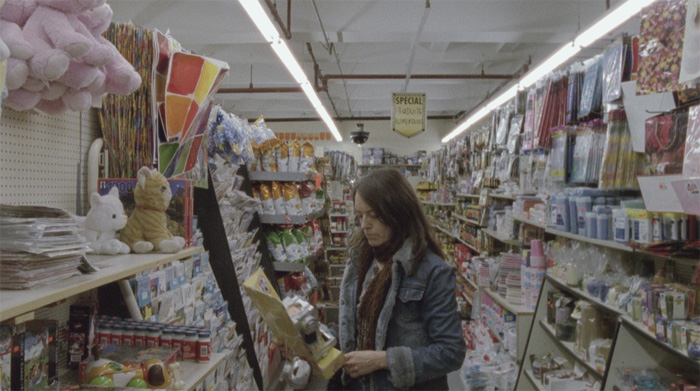
Les choses horribles [Horrible Things] – 11 minutes
Decorating his title cards with floral motif borders, Vincent Biron‘s Les choses horribles [Horrible Things] plays off that sort of technical design decadence with the uninspired attempts of his characters trying to make amends for wrongdoing. Horrible People may be more apt a name as each of the three leads find themselves conscience-stricken too late to do better than find a second rate replacement for what they have ruined.
Carole (Suzanne Lemoine) must apologize for missing her son’s birthday, Dede (Marc-Antoine Beaudette) for neglecting to care for a friend’s cat while she was away, and Steve (Sébastien David) for stealing from an old man trying to make friendly conversation. All selfish to a fault, there is something to the looks of embarrassment mixed with disinterest that proves whatever they do now means nothing since they still haven’t learned their lesson. It’s a well-constructed, subtly comic look into the guilt of the guilty and the tragic victims of their deceit.
B+
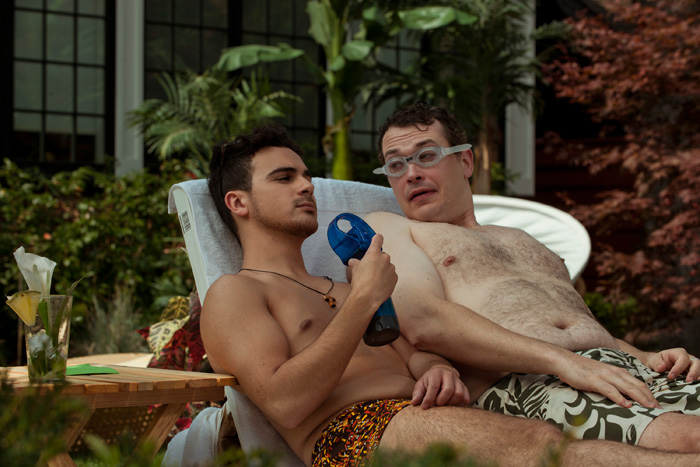
The Pool Date – 6 minutes
Going in a direction I should have seen coming but didn’t, Patrick Sisam‘s comedic short The Pool Date depicts how our will to seek retribution stops at nothing. Loaded with sexual undertones and the culture clash of identities, this simple yet profound study on our capacity for humility refuses to take the easy way out.
Vacationing in South America, Canadian Nigel (Mike Beaver) is looking to take a quick dip in the pool after carefully placing his Maple Leaf towel on a lounger next to his drink. Goggled and ready to drift through the mass of pretty people treading water, it’s his return to the surface that brings the plot’s central conceit. Dripping wet, he spies a local male stranger on his chair sipping from his glass. Entitled despite being in a country with customs he may not know, Nigel says nothing while he practically sits down on top of the intruder.
Unfazed, Rio (Adamo Ruggiero) makes room and shares the drink as the two find animosity replaced by congenial understanding. What began as a play of strength and ownership quickly moves to flirtatious territory without more than a couple quick glances and calculated moves. But no matter how sweetly humorous their partnership’s bond is, the final realization of what has happened trumps everything. A simple misunderstanding proves to be the best icebreaker a tourist could ask for.
A-
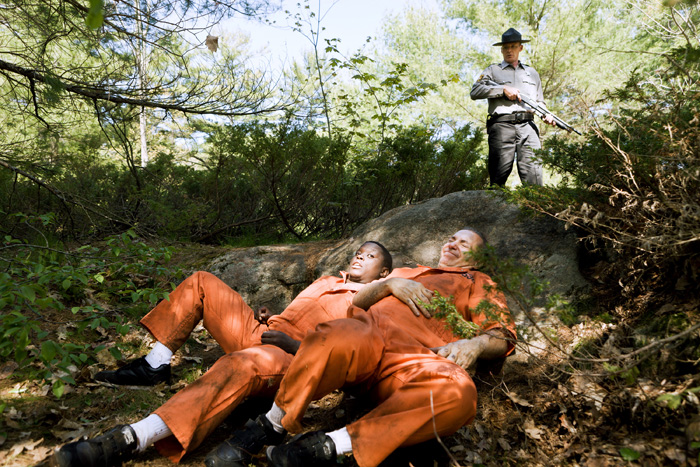
Canoejacked – 7 minutes
Giving the prison break genre a Canadian bent with the scenic serenity of a fisherman on his canoe as two escaped convicts flee an armed guard, Jonathan Williams‘ Canoejacked is just as silly as its name. Turning the unsuspecting hostage victim into a nudist and the criminals into changed men only adds to the implausibility once the trio learns they must work together to stay alive.
Jay Canavan‘s ruthless guard and Al Sapienza‘s Vinny have the over-the-top tough guy acts down while Falling Skies actor Mpho Koaho‘s Cisco bridges the gap to Pat Thornton‘s pantless nature lover. Situational comedy ensues as the fugitives realize they must look past their machismo for the solidarity of survival. Thornton’s unabashed strength of character proves the most memorable as he fearlessly stands up to the criminals. In fact, his plan for freedom’s unavoidable discomfort where Vinny and Cisco are concerned may be just as intentional as it is necessary.
B-
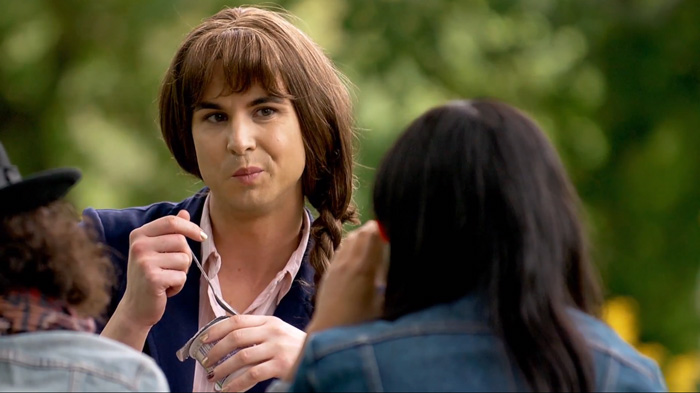
Shit Girls Say – 2 minutes
Sadly the screener I was given didn’t have access to this new short from the web series’ creators Graydon Sheppard and Kyle Humphrey. Being that it’s only two minutes, however, perhaps it will make its way online soon.
Short Cuts Canada Programme 6 plays at the Toronto International Film Festival on September 13th & 14th.
— Programme 1 – Programme 2 – Programme 3 —
— Programme 4 – Programme 5 – Programme 6 —

